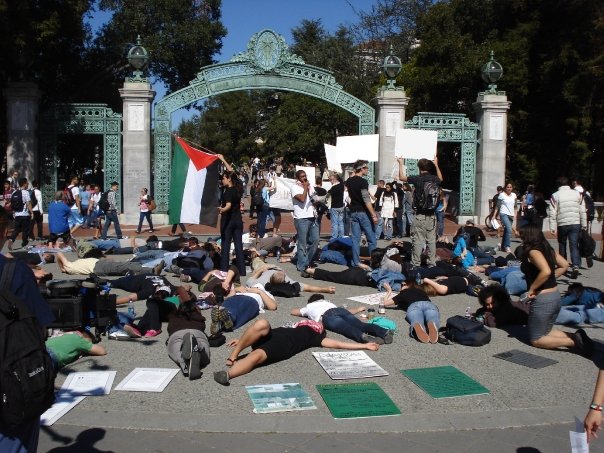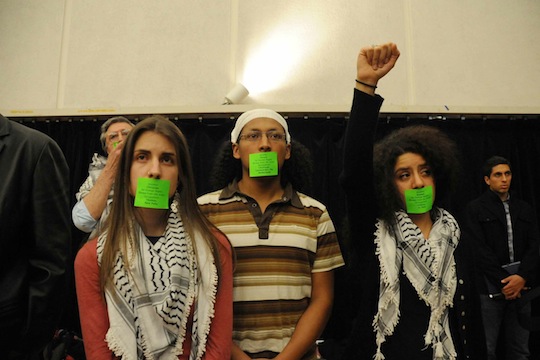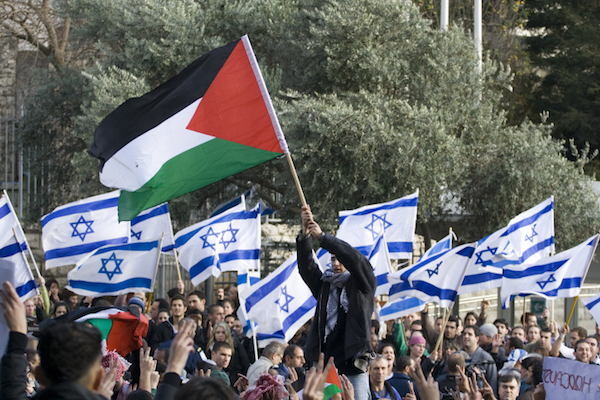A new study published by Stanford University reveals that Jewish students feel safer on university campuses when they refuse to conflate their Jewish identities with unequivocal support for the State of Israel.
By Oren Kroll-Zeldin

In recent years numerous studies have created the impression that university campuses across the United States are a hotbed of anti-Semitism and anti-Israel sentiment. These studies describe Jewish student experiences on campus, painting an alarming portrait of a politically unsafe climate for Jewish students who are ill equipped to deal with these challenges.
A new study published by Stanford University Graduate School of Education contests these beliefs, arguing not only that campuses are a safe place for Jewish students, but also that students are alienated by the very nature of the debate on anti-Semitism and the Israel-Palestine conflict. This groundbreaking new qualitative study, called “Safe and on the Sidelines,” is based on a 10-month study of Jewish students on five campuses across California, and highlights the subtleties of the experiences of Jewish students and emphasizes student voices to uncover a far more complex picture of Jewish life on campus – particularly regarding the complexities of the political debate they face on the Israel-Palestine conflict.
Contrary to what we often hear about Jewish experience on campus, the report argues that “students reported feeling comfortable on their campuses, and, more specifically, comfortable as Jews on their campuses.” Furthermore, the report finds that student safety is partially predicated on students’ refusal to conflate their Jewish identities with unequivocal support for the State of Israel, as students argue that they feel unsafe only when an attack on Israel becomes an attack on the Jewish community. In the study, less than 10 percent of respondents articulated the belief that anti-Israel sentiment is, by definition, anti-Semitism.
The report’s analysis provides other essential elements that help us more deeply understand Jewish student experiences on campus. First, the students who were interviewed expressed only limited amounts of anti-Semitism and discomfort. Those that did encounter discomfort “traced it either to the carelessness of student speech or to tensions within campus debates about the Israel-Palestine conflict,” not to targeted or intentional anti-Semitism. Second, students struggle with Israel. Though many feel an affinity to the Jewish state, they say its politics and policies are at odds with their own political values. Third, the divisive nature of the debate on campus about the Israel-Palestine conflict directly results in student disengagement from both political discourse and the campus Jewish community altogether. Even those students who wish to speak out often choose silence instead, intentionally removing themselves from the debate as an objection to the expectation that their Jewish identities mean that they have a particular politics.

The findings are welcome news, as they are largely reflective of my experience teaching courses on Jewish identity and the Israel-Palestine conflict at the University of San Francisco, a private Jesuit university in the heart of a major California metropolis, one that is often perceived as hostile for Jews and teeming with anti-Israel activists. The fact that my university was not included in the study serves to further cement the report’s findings that Jewish students are safe on campus and happily place themselves on the sidelines of hotly contested political debates vis-à-vis their Jewish identities. My experiences, as well as those of my colleagues and students, may help to elucidate just how far we have been mislead to believe that Jewish student lives are in peril on American campuses.
First, for many of my students, campus activism is a privilege that they simply cannot afford. They are preoccupied with the menial tasks of everyday life in their attempts to survive economically, physically, and emotionally in a harsh and expensive urban environment. Participating in campus activism is simply not an option for full-time students who also work full or part time to support themselves. Moreover, most of them commute to school, taking up more of their time and further preventing them from engaging in campus activism.
Second, student activists on my campus – both Jewish and others – do not feel that the Israel-Palestine conflict is as relevant to their lives as other social and political issues, which have only been exacerbated by the divisive rhetoric and racist policies of the Trump administration. Those who do have time for campus activism have other interests and political concerns, in particular the president’s decision to rescind DACA, which has tangible ramifications for our campus community that go far beyond any existential connections between the Israel-Palestine conflict and a private university in California. In fact, most of the Jewish students that I have encountered on campus are unaffiliated when it comes to connecting their Jewish identity with the State of Israel, rejecting attempts to conflate the two. Simply put, the politics of Israel and Palestine do not play a large role in their lives of the Jewish students who enter my classroom.

Lastly, my university is not a hotbed of activism for Israel and Palestine politics, which is reflective of the larger political climate across U.S. campuses. For every campus labeled a flashpoint, such as U.C. Berkeley or Stanford (both of which are featured in the report), there are dozens of schools that are not perceived as a dangerous crossroads for political debate on the Israel-Palestine conflict. Campuses are diverse, representing a multiplicity of ethnic, cultural, religious and political expressions of student identities. Some students choose to engage with the Israel-Palestine conflict, yet most do not – a fact whose significance cannot be understated.
All of this does not imply that Jewish students are bystanders to the Israel-Palestine conversation on campus. Instead, it appears that they assert their agency and most are making an informed decision to disengage from the debate, feeling empowered by their choice. The Jewish students with whom I work are engaged in a practice they find more relevant and personally meaningful than participating in the public debate over the Israel-Palestine conflict. Through a deep engagement with the curriculum and material they encounter in class, they cultivate the capacity to think critically, impacting their Jewish identities and transforming the ways they articulate their political commitments in their everyday lives. In doing so, they put their university training to use as agents of change in their communities.
The life experiences of students today are different than those of their parents and grandparents. To this end, the new report is an encouraging reminder that although anti-Semitism undoubtedly still exists in numerous insidious forms, university campuses remain a place where Jewish students can feel safe to explore the complexities and multi-layered nature of their identities, while struggling with what it means to be Jewish in the 21st century. For some, the State of Israel will be central to their Jewish journey, but for many it will not. That is perfectly okay: it speaks to the wonderful nature of Jewish identity in all its plurality, diversity, and multiplicity.
Dr. Oren Kroll-Zeldin is a cultural anthropologist who teaches in the Jewish Studies and Social Justice program at the University of San Francisco. He researches the systematic and physical exclusion of Palestinians from Jerusalem.
